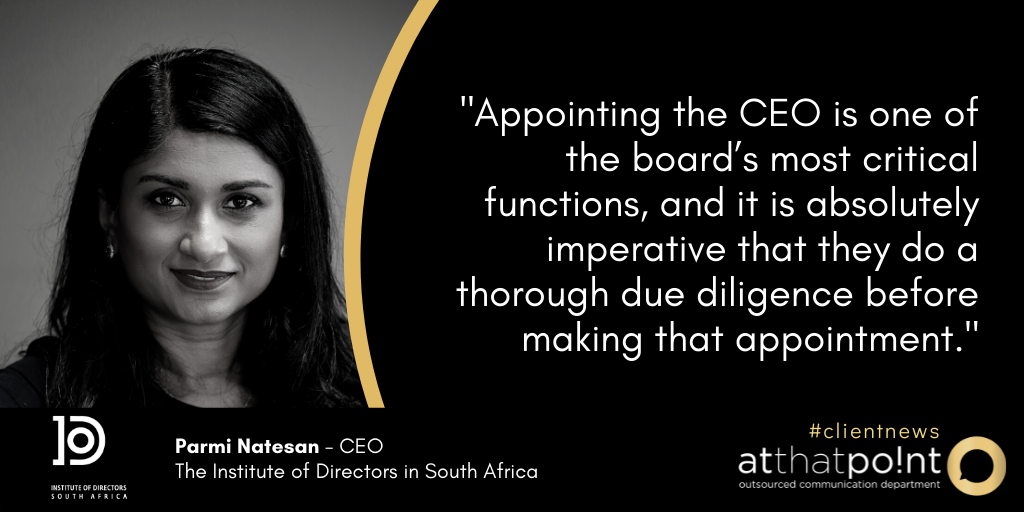|
Volume 1 of the second Zondo Report (Zondo 2),[1] which deals with Transnet, graphically shows how important it is for a CEO to appointed who has the right qualities—and, consequently, the board’s respect. CEO appointments should be the prerogative of the board in terms of governance best practice, argues Parmi Natesan, CEO, Institute of Directors in South Africa (IoDSA).
“Appointing the CEO is one of the board’s most critical functions, and it is absolutely imperative that they do a thorough due diligence before making that appointment,” she says. “The Transnet saga also demonstrates something the IoDSA has been calling out for years: the dangerous role confusion in SOEs when it comes to senior appointments. The Report implies that Mr Gama’s appointment as CEO of Transnet was only made possible because of sustained political interference to subvert good governance.” The challenge for SOEs is that their legislative framework gives Government, via the relevant Minister, the power to make senior appointments. However, this goes against good governance as outlined in King IV, which recommends that the Board appoint the CEO. According to the SOE supplement to King IV, “As a matter of good practice, the appointment of the CEO of an SOE should be a robust and transparent process that involves the Accounting Authority (Board) to the greatest extent possible, even if the shareholder has the right to make the final appointment.”[2] Initially, good governance prevailed. The board applied their collective minds and determined that Mr Gama did not have the skills needed to fulfil the role adequately, and he was not shortlisted. According to the Report, the then-Minister, Barbara Hogan, duly made her choice from the Board’s shortlist. However, then-President Zuma refused to accept it, demanding that an alternative candidate, Siyabonga Gama, be appointed. A new Minister and board later, another candidate favoured by President Zuma, Brian Molefe, was appointed at CEO. Mr Gama was later appointed to the position of Group CEO in 2016 during the tenure of Lynne Brown as Minister of Public Enterprises. At this stage, the Report infers that a more malleable board rubberstamped the appointment, even though Mr Gama had recently been dismissed as CEO of Transnet Freight Rail for serious acts of misconduct. The irony is that he was later also removed from his position as CEO of Transnet itself “…because of serious violations of his financial procurement and fiduciary responsibilities and the board having lost trust and confidence in his ability to lead Transnet” (at 164, p 72). Ms Natesan says that clear lessons emerge from this sequence of events that boards, and particularly boards of SOEs must take to heart:
“If the principles of good governance are flouted in an important area like this, the result is disaster, as this case so unfortunately shows,” Ms Natesan concludes. ENDS MEDIA CONTACT: Idéle Prinsloo, [email protected], 084 587 9933, www.atthatpoint.co.za For more information on the IoDSA please visit: Website: www.iodsa.co.za Twitter: @The_IoDSA LinkedIn: Institute of Directors South Africa Company Page Facebook: Institute of Directors South Africa [1] Judicial Commision of Inquiry into State Capture Report: Part 2, Vol 1: Transnet, available at https://cisp.cachefly.net/assets/articles/attachments/87235_part_2_vol_1_trasnet_report_of_the_state_capture_commission_part_ii_vol_i_010222.pdf. [2] IoDSA, Report on corporate governance for South Africa 2016, p 116.
0 Comments
Leave a Reply. |
Archives
July 2024
Categories
All
|


 RSS Feed
RSS Feed